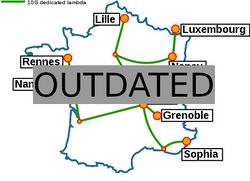Grid5000:Home: Difference between revisions
No edit summary |
No edit summary |
||
| Line 27: | Line 27: | ||
<br> | <br> | ||
{{#status:0|0|0|http://bugzilla.grid5000.fr/status/upcoming.json}} | {{#status:0|0|0|http://bugzilla.grid5000.fr/status/upcoming.json}} | ||
<br> | |||
{{#publications:}} | {{#publications:}} | ||
Revision as of 10:17, 23 March 2018
|
Grid'5000 is a large-scale and versatile testbed for experiment-driven research in all areas of computer science, with a focus on parallel and distributed computing including Cloud, HPC and Big Data. Key features:
|
Five random publications that benefited from Grid'5000 (at least 2937 overall):
- Thomas Firmin, Pierre Boulet, El-Ghazali Talbi. Asynchronous Multi-fidelity Hyperparameter Optimization Of Spiking Neural Networks. International Conference on Neuromorphic Systems (ICONS 2024), Jul 2024, Washington, United States. hal-04781629 view on HAL pdf
- Wèdan Emmanuel Gnibga. Modeling and optimization of Edge infrastructures and their electrical systems. Databases cs.DB. Université de Rennes, 2024. English. NNT : 2024URENS069. tel-04967447 view on HAL pdf
- Sweta Suresh, Maxime Guillaud. Belief Propagation Decoding of Tensor-Based Modulation for Unsourced Random Access. IZS 2026 - International Zurich Seminar on Information and Communication, Feb 2026, Zurich, Switzerland. hal-05451488 view on HAL pdf
- Adrien Schoen, Gregory Blanc, Pierre-François Gimenez, Yufei Han, Frédéric Majorczyk, et al.. A tale of two methods: unveiling the limitations of GAN and the rise of bayesian networks for synthetic network traffic generation. 2024 IEEE European Symposium on Security and Privacy Workshops (EuroS&PW), Jul 2024, Vienna, Austria. pp.273-286, 10.1109/EuroSPW61312.2024.00036. hal-04871298 view on HAL pdf
- Donatien Schmitz, Guillaume Rosinosky, Etienne Rivière. Justin: Hybrid CPU/Memory Elastic Scaling for Distributed Stream Processing ⋆. DAIS 2025 - 25th International Conference on Distributed Applications and Interoperable Systems, Daniel Balouek; Ibéria Medeiros, Jun 2025, Lille, France. pp.1-17. hal-05081993 view on HAL pdf
Latest news
Failed to load RSS feed from https://www.grid5000.fr/mediawiki/index.php?title=News&action=feed&feed=atom: Error parsing XML for RSS
Grid'5000 sites
Current funding
As from June 2008, Inria is the main contributor to Grid'5000 funding.
INRIA |
CNRS |
UniversitiesUniversité Grenoble Alpes, Grenoble INP |
Regional councilsAquitaine |


